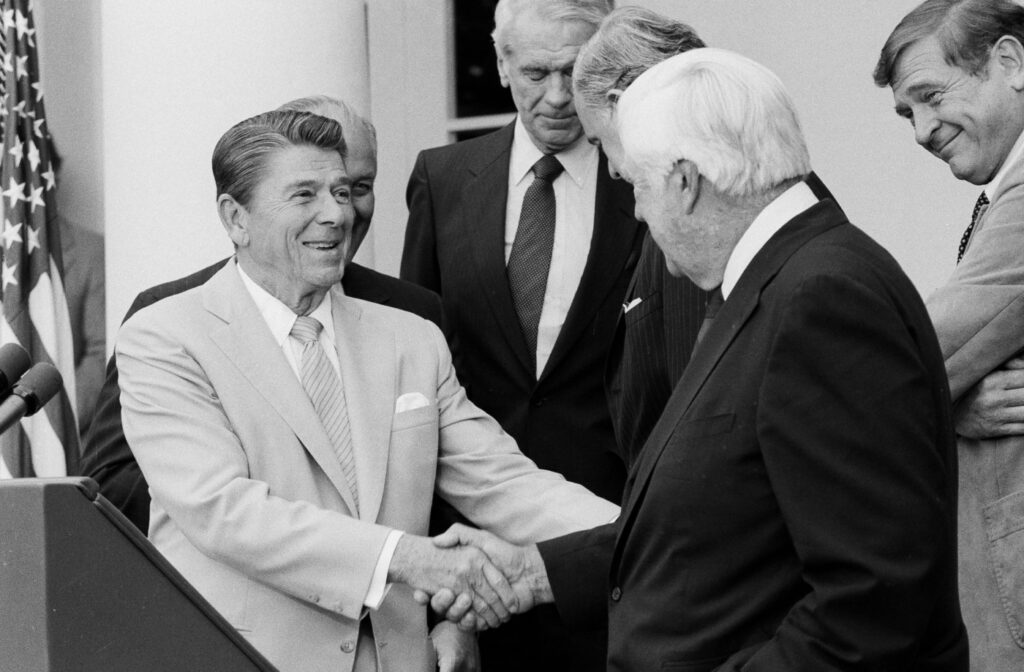
In his State of the Union Address on January 16, 1982, President Ronald Reagan promised, “I will seek no tax increases this year, and I have no intention of retreating from our basic program of tax relief…I will stand by my word.” But seven months later, on August 16th, Reagan went on national television and held his nose to violate that State of the Union pledge by advocating legislation to increase Americans’ taxes by nearly $100 billion. Putting lipstick on pigs is an art form with Congressional revenue seekers, and the porker Reagan was asked to sell was called the Tax Equity and Fiscal Responsibility Act (TEFRA). So, forty years ago on September 3, 1982, Reagan signed a tax hike he later sorely regretted.
When preparing January’s State of the Union speech, the President reached out to meet with me – as his former chief speechwriter – for advice and counsel, but when it came to the issue of raising taxes, he didn’t need anyone telling him what to say. He was adamant about not giving in to raising money on the backs of his fellow citizens. Sitting across a coffee table, he set his glasses down, pointed to me and cited Great Britain Prime Minister Margaret Thatcher’s huge mistake in raising excise taxes and vowed not to do the same. Nevertheless, over the intervening months, House Speaker, Tip O’Neill, Republican tax-writers, and those within Reagan’s own staff pressed him to accept what the President became convinced would be a one-time compromise that would cut government spending.
So, in his televised speech the President swallowed hard and used code words to sell TEFRA, calling it “greatest tax reform in history.” He touted there would be “better compliance with the tax laws…closing off special interest loopholes….” He further argued it would only affect those “who are presently evading their fair share of the tax burden…and will make our tax system more fair for every American…”
It sure sounds likes that apologia of four decades ago to “close loopholes” and make folks pay their “fair share” has an eerily familiar ring today, doesn’t it? Five weeks ago, Senator Joe Manchin sold his and Senator Chuck Schumer’s tax and budget-busting plan as something other than it really is. “We did not raise taxes,” Manchin reassured Fox News. “We’ve closed loopholes. I made sure there were no tax increases in this whatsoever.” And when Joe Biden gets in front of the teleprompter, the words he tiresomely reads by rote include the mantra that the wealthy must pay their “fair share.” We know, of course, those recitations are hokum, and that more than one study has already shown that the falsely named “Inflation Reduction Act” includes taxes that will trickle down to the middle class, and sweeteners in the form of tax incentives for businesses were put in place to ensure the bill’s passage.
The difference between then and now is clear. Reagan wasn’t happy with what he did. Joe Biden, Chuck Schumer, Nancy Pelosi and now, even Joe Manchin, eagerly embrace higher taxation as a tool of big government. President Reagan told me there was only one reason he bought into 1982’s massive tax and budget boondoggle, and that was because he was falsely promised $280 billion in spending cuts in return for the $99 billion in tax increases. His staff and Congressional budget writers convinced him his “deal” achieved a three to one ratio of spending cuts to tax increases to attain his goal of budget reductions and lower deficits. He signed on with extreme reluctance – and used rhetorical gymnastics to justify reneging on his true beliefs.
When years later, we sat down to collaborate on his farewell address to the 1988 Republican Convention, he sadly reflected, “one of the worst mistakes I ever made was signing the 1982 tax bill. They promised me three dollars in revenue cuts for every dollar of new taxes, and I was sold a bill of goods. Instead, we got a dollar-seventy in new spending for every tax dollar, and the deficit exploded. I should have stuck to my principles.”
Related Articles
Newsom calls GOP governors “bullies,” but what about him?
Who should have the power to ban?
Of course the FBI is subject to political influence
No wet people without wetlands
Proposition 1 and the return of democracy to abortion
Given Reagan’s sweet nature, he didn’t blame those around him for being misled; only himself for giving in. James Baker, his chief of staff, led the way in pressing him to accept the flawed deal and has since acknowledged that Reagan believed that it was among the worst decisions of his presidency. Baker has further conceded, “I’m not so sure today that he wasn’t right…” and that those around him were “accommodating to the political exigencies that were extant at that time. That’s what he (Reagan) was doing. His heart wasn’t in it. And I’m not so sure that we wouldn’t have still been all right, even if we hadn’t done that – in retrospect.”
Looking back, Reagan knew he should have vetoed TEFRA, and his economic recovery program would have worked without the damage done to the deficit. Senators Manchin, Kyrsten Sinema and their more moderate colleagues should take heed from Reagan’s experience that “political exigencies” result in poor policy. The ephemera of “loopholes,” and siren song of “excise” taxes are easy to hide behind when selling something alien to their ideals, but they shouldn’t wait late in their careers to undo their mistakes – the kind that Ronald Reagan rued to be among the worst of his presidency.
Kenneth Khachigian was Chief Speechwriter to Ronald Reagan and is currently preparing a memoir of his years as an aide to Presidents Reagan and Richard Nixon.
